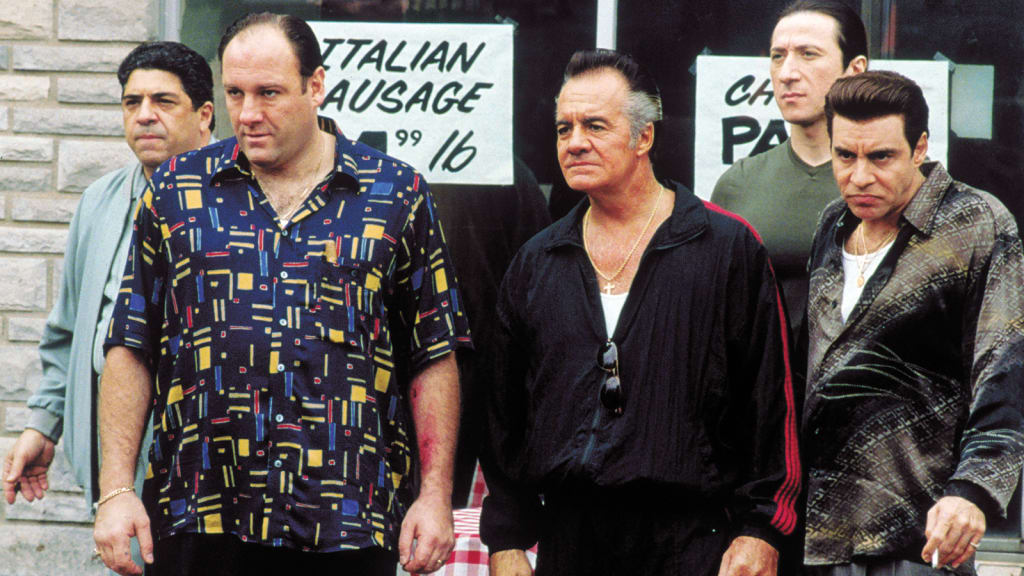Is The Sopranos the Most Rewatchable Show of All Times?
A look into the many aspects that made the show a timeless masterpiece.

*This essay contains spoilers. *
The Sopranos is currently in the middle of a cultural revival. Debuting in 1999 and concluding in 2007, it revitalized the dying genre of the TV drama, bringing a whole new level of nuance and sophistication never-before seen on the medium. No show has influenced television more in the 21st Century; it set the tone and style which would later influence practically every television series that came after. Its success was a in large part due to the hands-off approach HBO had on the making of the show, allowing creator David Chase the time and space to explore themes and stories that were rarely tackled to such a depth on TV.
The viewing numbers for The Sopranos have skyrocketed during the middle of the pandemic. Much like The Office found a resurgence through the streaming service Netflix four years after it ended, The Sopranos is experiencing a similar level of growth and affection in popular culture through HBOMAX. It was one of HBO's most watched shows during 2020, and has shown no indication of decreasing its popularity, rivaling the numbers of programs like Westworld and Game of Thrones, who are (relatively) fresh out of the market.
The show has had a decent following since its conclusion, but now more people seem eager to join in on the hype and experience. Short clips of scenes and moments from the show are constantly being watched and shared by fans on social media, and the number of quotes shared in reference rival those of the most popular shows on streaming platforms. A large community has grown from a show that has been off the air for more than 13 years.
A point of interest on what makes the show so appealing is found in the amount of people who have said they have watched it numerous times. For the most part, dramas aren't as rewatchable as sitcoms. There are exceptions to this trend (Lost, The West Wing, and even [parts] of Game of Thrones come to mind), but the honor of winning millions of dollars through syndication mostly belongs to the comedy genre.
The Sopranos seems to buck the trend in that not only is it very rewatchable, but has remained relevant to the current conditions of the modern world. People are relating to The Sopranos despite taking place in a culture twenty years in the past.
What makes The Sopranos a unique phenomenon when it first aired to the present day is its powerful ability to fully capture the times they depicted while maintaining a sense of unpredictability. It was the perfect blend of absurdism and reality. This tone and style are in large part due to David Chase's extreme and pessimistic outlook on modernity. Chase has maintained over the years how The Sopranos was always meant to be a show about a family man who happens to be a mobster and not the other way around. This is crucial to understanding the inner world they inhabit, a world grounded on reality but desensitized to the consequences of its actions.
No show has been able to capture the current conditions of its existence quite like The Sopranos did. Most shows trying to make a social statement have to disguise their story as a fantasy or epic tale. The Sopranos removed - or much rather stripped, these flashy and unrealistic depictions of modern life and brought them back to the sick and twisted reality of our own backyard.
Audiences were gripped by both Tony Soprano's destructive personality and his desire to be good in some form or another. His psychiatrist, Dr. Jennifer Melfi, best summarizes these sentiments when confessing to a colleague that treating him is like seeing a train wreck unfold, and she can't help but look in amazement. The comment also speaks to the viewers' sensibilities, as both we and Melfi continue to see Tony's actions unfold out of morbid curiosity. The show never abandons this feature by always giving us a glimmer of hope that Tony will find a way to do the right thing, even if such an act amounts to wishful thinking.
However, the most contributing factor in prolonging its mass appeal can be perhaps best found in the humor of the show. It is one of the funniest shows ever created, rivaling the humor and satire of sitcoms like Seinfeld, Fawlty Towers, and Community.
It finds its humor through the character's interaction with one another. The constant bickering and arguing only to later calm down and think the consequences through is a constant throughout the show. The situations and the attitudes towards them result in a recipe full of humor through absurdism. One could make an argument that the episode "Pine Barrens" is a masterpiece in comedy that rivals Monty Python and the Holy Grail or It's a Mad Mad Mad Mad World in depicting what would be considered serious circumstances under normal conditions into an over-the-top journey without any semblance to reality.
It is hard to describe what makes the humor work to such perfection. Unlike the Marvel style of humor (with the exception of the masterful Thor: Ragnarök), there is more nuance behind it than just mere appeal. Chase was intentionally trying to make a point about how our lives, aside from the criminal activities, are just as absurd and hilarious as the daily life of mobsters. They get angry at the same things we do, they feel the same fears and frustrations about parenting we do, and they break balls and feel as incompetent as we do. This level of connection is not one expects from people like them, yet The Sopranos finds a way to bridge the gap by purposefully turning it into a comedy demonstrating how they are the creators of their own Hell despite constantly asking themselves why they are suffering.
A moment that best explains this dynamic can be found in the final episode of season 3, "Army of One". In a burial scene, in what is suppose to be a serious and tragic moment, the show can't help but highlight the hypocrisy and shame of its characters by humorously showing them running away from FBI agents waiting to arrest them. This is later contrasted by a very emotional moment of a mother screaming in despair over her son's death. Neither moment seems out of place because of the life and world they have created through their decisions.
The Sopranos' popularity lies in its paradoxical exploration of human behavior by using the most extreme of circumstances a regular person can find themselves in. The final season makes it explicitly clear that these people are always living under the constant threat of fear and danger. The underlying tragedy behind this is how oblivious and in denial they are to the decisions they made in life. What the characters perceive themselves to be versus what they really are to everyone else is the fundamental dynamic that keeps every scene of the show from functioning.
Many have described The Sopranos as a black comedy, but I believe this classification only limits the scope of the humor. The jokes have layers beyond just being morbid or cruel. They represent a perception and attitude in the world that encompasses all walks of life, to pessimism, prejudice, irony, grotesque, and even surreal. It is so varied and layered in is approach you can't help but feel a sense of amazement that it worked.
It is hard to objectively say out of all television programs out there that The Sopranos is indeed the most rewatchable to ever grace the small screen. These things are in the end segmented into fragments of fanatics that each have their fair share of people who have watched their favorite shows multiple times. If we are to get to the bottom of this, a high-powered poll amassing data at rapid and efficient pace would have to do the trick, and I have no access to such a machine.
The only quantifiable measure available is its endurance among even modern television programs, the depth and layers behind characters and their actions, and the untying themes it refuses to shy away from. Whether or not it's the most rewatchable show ever is up to the personal viewer, but at the very least it can be said that no show will ever have as many reasons as The Sopranos has to be watched over and over again. The ducks will always be back, eventually.
About the Creator
Ezra I. James
Absurd essayist from the outskirts of Shambhala.






Comments
There are no comments for this story
Be the first to respond and start the conversation.